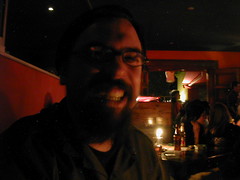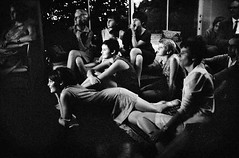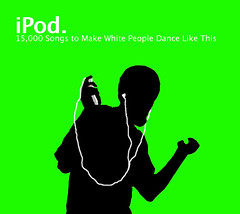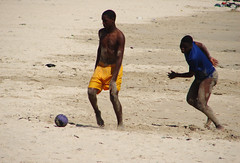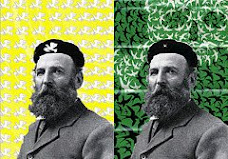Monday, October 23, 2006
NUL Afrikaans electronic music
Adriaan is an old friend of mine, and this Saturday he gigged at The Bohemian Johannesburg. Mhambi can't recommend their music too highly. It's a touch avant guard and inteligent crafted music, but very groovy. You can download it for free from their website.
Sphere: Related Content
Posted by
Wessel
at
2:24 pm
0
comments
![]()
Friday, October 20, 2006
Comrade + oppressor = compressor
Mhambi, attended a breakfast hosted by the Sociology of work unit (SWOP) at Wits university. Here research of declining solidarity at the National Union of Mineworkers (NUM), South Africa's largest union, were presented. The reasons given were ethnic conflict, corruption, increased outsourcing, and shop stewarts drawn into management structures (the compressors). NUM commisioned the research and should be congratiolated for being so open.
Talking of compressors of a different kind, the BBC has finally reported on the murder of Somalis in Cape Town by local business men. Mhambi has it on good authority that its taking place country wide, especially in the Free State province.
Here are the official figures of asylum seekers in South Africa (2004).
DR Congo 9,516 refugees and 4,622 asylum applications
Somalia 7,118 refugees and 3,893 asylum applications
Zimbabwe 5,789 asylum applications
Ethiopia 2,795 asylum applications
Angola 5,774 refugees
Burundi 2,075 refugees
Rwanda 1,266 refugees
Posted by
Wessel
at
7:37 am
0
comments
![]()
Labels: crime, immigration, left or right, Trade unions, xenophobia
Thursday, October 19, 2006
Goldblatt revisits some Afrikaners
Between 1961 and 1968, Goldblatt photographed Afrikaners initially around small-holdings near Randfontein, next in the Marico Bushveld and then more generally. Some of the black and white photographs were reproduced in specialist magazines, but it took Goldblatt until 1975 to find a publisher for the book that he envisaged - today a much-sought-after collector's item.
Of his decision to revisit this work and publish a new book two decades later, Goldblatt writes:
I have frequently been asked why I didn't produce a second edition. There were two reasons. First, I had done what I set out to do and was strongly disinclined to go over the same ground again. Second, since the reproduction negatives and plates and many of my original prints no longer existed, I would have had to produce a new set of darkroom prints, a hugely time-consuming task, especially unattractive when I had other projects in progress.
But then in 2004 I again visited Gamka's Kloof (Die Hel) and met Annetjie Mostert Joubert, the last of the Klowers still living there. Her infectious love of the place and of the community that was no more moved me greatly, and when I got home I looked carefully at the work I had done there in 1966-67 and 1967-68. There was quite a lot that I hadn't put into the 1975 book and it seemed sufficiently interesting to merit publication now, particularly since that unique community had completely disappeared. This led me to think not simply of a second edition but of an expanded book bringing into it various photographs from the work of that time as well as commentaries by two people whose views I value: Antjie Krog and Ivor Powell.
The possibility of a new book was made far more attractive by the experience I had gained in the past few years in digital reproduction of photographs. This technology obviated the need for me to produce a new set of hand-prints, while attaining subtleties and qualities in the new reproductions comparable to anything I could do in the darkroom.
See some of Goldblatt's Afrikaner photos here.
Sphere: Related Content
Posted by
Wessel
at
9:19 am
0
comments
![]()
Labels: graphics art and culture, photography
My traitor's heart 2
Rian Malan, South African author has had another change of heart. Two years ago the rebel Malan - who had lived in New York and had written My Traitor's heart, a lucid, eloquent and intellectual defence of white fears of black South Africans (some would argue racist) - had recanted.
He confessed that he choked on the generosity and enormity of Mandela's gift and had not seen it for what it was.
So redeemed was he in the eys of the left, that he was even qouted in the UK Guardian by Rory Carroll on returning to Johannesburg: "Foreigners think we're nuts, coming back to a doomed city on a damned continent, but there's something you don't understand: it's boring where you are." (Yes, that Rory Carroll.)
Now Malan has written in the British Spectator "Not a civil war but sad decay" (registration required), that he recanted too soon.When the winter rains closed in on Cape Town I thought, bugger this, I’m selling up and moving somewhere sunny. To this end, I asked the char, Mrs Primrose Gwayana, to come in and help spruce up the house. We were scrubbing and painting and what have you when Primrose’s broom bumped the dining table, and crack — a leg snapped off, its innards hollowed out by wood-borers. I thought, uh-oh, here’s an omen. Something awful is going to happen. And it has.
Nine months ago South Africa seemed to be muddling through in a happy-go-lucky fashion. The economy was growing, albeit slowly. Trains ran, if not exactly on time. If you called the police, they eventually came. We thought our table was fairly solid, and that we would sit at it indefinitely, quaffing that old Rainbow Nation ambrosia. Now, almost overnight, we have come to the dismaying realisation that much around us is rotten. Nearly half our provinces and municipalities are said to be on the verge of collapse. A murderous succession dispute has broken out in the ruling African National Congress. Our Auditor–General reportedly has sleepless nights on account of the billions that cannot be properly accounted for.
Posted by
Wessel
at
6:20 am
0
comments
![]()
Wednesday, October 18, 2006
Filling station
Meyer has been compared to Pierneef as an inportant South African painter. But where Pierneefs painting's show the glorius wide empty spaces of SA, just waiting to be explored, Meyer's are quite different. Often bleak and desolate they speak of the depopulated platteland (rural areas) and slow decay.
Sphere: Related Content
Posted by
Wessel
at
3:09 am
0
comments
![]()
Monday, October 16, 2006
De la Rey Bok van Blerk musiek video
The music video of Bok van Blerk's Delarey song. A song which has made Tim du Plessis, editor of Afrikaans Sunday papper Rapport, warn about resurgent Afrikaner unity. See an English translation of Bok van Berk's Delarey song here.
Bok is not the only Afrikaans boytjie touching on Afrikaner nationalism. Fokofpolisiekar - the boere punks - recently released a track called, "Brand Suid-Afrika" (Burn South Africa).
Think back 16 years. The alternatiewe Afrikaanse beweging (alternative Afrikaans movement) then was very political. They sought to challenge the Afrikaner Nationalist regime. But since then Afrikaans music has - on the whole - shied away from political references.
Interestingly enough, Shifty records, the little record lable started by the rooinek Lloyd Ross that launched the whole Alternative movement, has now recorded an album by author Rian Malan. Operating from a caravan hitched to a Ford V6 truck, the Shifty studio would produce an album by the likes of Koos Kombuis, Johannes Kerkorrel and Bernoldus Niemand (James Phillips) every two months until 1993.
Malan's album is the first from the Shifty's stable in more than a decade. Called Alien inboorling (Alien native), its a very well produced, excellently crafted album (both lyrically and musically) capturing the current zeitgeist of the so-called alternative Afrikaners. And the state of mind is not that different from the Afrikaner mainstream: It's about identity crisis, marginalisation, crime, guilt, hope and immigration. Malan just says it better and more beautifully.
Update
Bok's song has caused such a commotion that he has saught advice from Afrikaans cultural icon Koos Kombuis.
Posted by
Wessel
at
10:40 am
26
comments
![]()
Labels: Afrikaner, De la Rey, identityPolitics, music, video
Thursday, October 12, 2006
Yahoo! get their knickers into a twist
Mhambi would like to register his displeasure. His favorite Flickr members Tetheredtothesun have disappeared, including hundreds of gorgeous (and titillating) photos and all from Flickr. But Mhambi expects he knows what happened. See Flickr is owned by Yahoo!
Now Rose and Olive certainly did not get the boot because their pictures were too risque. Nope, there are many pictures on Flickr far more revealing and with less artistic merit, than these two delicious gals' pics.
Nope, one suspects that some manager (with an MBA no doubt) read on their flickr pages that Olive and Rose were starting a paid for site at Nerve, thus soliciting business to a rival! How can they! The outrage!!
Now only an old style manager with no conception of how new media works would try and keep his audience from wondering to other websites, and destroy good content and allot of good will to boot. Yahoo! will always play catch-up while their new media savvy staff have to play second fiddle too a bunch of managers that still don't get the net.
Posted by
Wessel
at
2:17 pm
0
comments
![]()
Labels: FlickrPhotoGraphers, Rose and Olive, web 2.0, websites
The unbearable whiteness of being
Talking about whiteness is suddenly all the rage here in South Africa. But it's not so much the whities talking about their whiteness, as it is black South Africans and academia that are.
A friend of mine has just left for Brazil where she is to give a paper on Whiteness in SA. And this week on SAFM - the premier South African radio station - there were a number of programs where they touched on the subject.
On the form, to be filled in by employers as part of government‘s equity reports, people are given a choice of being either African, coloured (a very South African classification), Indian or white. The clear implication, therefore, is that whites, coloureds and Indians cannot be African.
Good heavens Mhambi thought to himself! Does the boy know nothing about his own Afrikaner history?? If an Afrikaner student leader is such an ignoramus, perhaps the Afrikaners deserve to see their history trampled. Sies man!
What followed was caller upon caller who heaped scorn on the whities. They had done nothing to reconcile with their countrymen, they obstructed redistribution of wealth, and they were downright racist. In short, they were not sorry for Apartheid.
Posted by
Wessel
at
1:44 pm
3
comments
![]()
Labels: Africaness, Afrikaner, identityPolitics, whiteness
Thursday, October 05, 2006
The World Cup can save SA
According to Lionel Mtshali the World Cup can help South Africa onto the right path. The facts speak for themselves: about half of all municipalities are dysfunctional; councils in general have failed to collect billions of rand in arrears, and more billions are left unspent in provincial coffers each year. The story holds true across the vast spectrum of the public sector.
Our hosting of the World Cup has the capacity to change this. The close foreign scrutiny will supply the kind of inspection and oversight the eroded domestic opposition has been unable to deliver. The self-congratulatory rhetoric which has been reserved for the public’s consumption will be unlikely to appeal to foreign visitors, who will expect results, not the usual excuses that blame every-thing on apartheid.
But Mtshali contradicts himself, "It will have to accept that increased spending has not necessarily led to either increased efficiency or increased effectiveness." A case of neoliberal double speak?
Like he asserts himself, millions have been left unspent. The problem is a lack of social spending, AND inefficiency. Hopefully football can save us from this. Sphere: Related Content
Posted by
Wessel
at
8:40 am
0
comments
![]()
The Afrikaners are restless
According to Tim du Plessis the Afrikaners are growing restless, and this manifests in them becoming "passively destructive within the law".
I went to see a rock outfit called Bok van Blerk. The lead singer, an articulate, rather charismatic Pretoria boykie in his early 20s, started his show saying: It’s good to be at Aardklop. It’s good to walk the streets and see Afrikaners smiling and having a jol. We need to be proud of our history and ourselves. We don’t have to apologise.
Wild applause followed.
Halfway into his show he sings a song about Gen Koos de la Rey, the Anglo Boer War hero. Once again the teenage audience goes crazy. “De la Rey, De la Rey, sal jy die Boere lei,” sings Bok. The youngsters jump up and wave their arms as if they are at a Pentecostal church service.
A rudderless volk
Mhambi finds this trend not surprising but very worrying. There are no leadership in Afrikaner circles today. And when some emerges Mhambi fears that it would be of the wrong kind. The likes of the old Nats like De Klerk have all but completely gone quiet, while potential young left inclined Afrikaner leaders do not want to associate along ethnic lines.
Posted by
Wessel
at
8:16 am
2
comments
![]()
